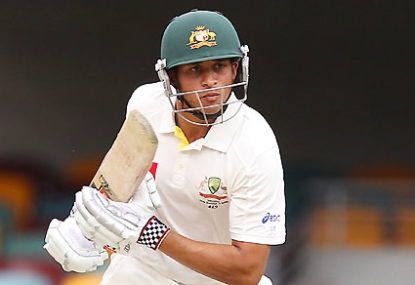The Australian selectors will disgrace themselves if they jettison Usman Khawaja in favour of recalling Phillip Hughes or Matthew Wade for the fifth Ashes Test.
How is it possible to identify whether Khawaja is cut out for Test cricket if he is never afforded more than three matches before being dropped?
The elegant left hander has played only nine Tests but rumours suggest he is on the verge of being dumped from the side for a third time.
Admittedly, Khawaja has had a poor series with 114 runs at an average of 23 (discounting his comical dismissal in the first innings at Manchester).
But his failures should be kept in context. Only three batsmen, Aussies Michael Clarke and Shane Watson, and England’s Ian Bell, have averaged more than 37 this series.
The highly-credentialed English trio of Alastair Cook, Jonathan Trott and Matt Prior have combined for 498 runs at the paltry average of 22.
That is not an excuse for underperformance, and Khawaja should be disappointed with his inability to exploit the opportunities offered to him the past month.
His efforts hardly demand demotion though, particularly when his potential replacements are a batsman with woeful recent Test form and a wicketkeeper bizarrely being considered for a specialist role with the blade.
Hughes has been exposed as possessing significant technical flaws both against pace and spin.
His 81 not out in the first Test at Trent Bridge proved to be yet another false dawn as he scored just two runs from his following three innings.
Since the Australia summer he has averaged 21 in Tests and been dismissed for single-figure scores in eight of 12 innings.
The 24-year-old should not be written off as a Test player, but he should not be selected again until he proves he can prosper against pace bowling on lively pitches and that he has manufactured a reliable method of scoring from spin bowlers.
Whether he learns to use his feet to the tweakers, develops the ability to play the sweep shot, or trains himself to use the full depth of the crease to cut and pull length deliveries, Hughes must identify a means of rotating the strike.
Wade, meanwhile, ought not to be considered for a role as a specialist batsman without displaying at first-class level that he can effectively discharge such duties.
If the selectors are so dismayed by the level of batting talent in Australia that they wish to convert Wade into a batsman, surely such an experiment should be conducted at State, not international, level.
There are six rounds of Shield matches prior to the first Ashes Test at Brisbane from November 21.
The Victorian could be asked to give up the gloves and churn out runs in the middle order to earn the right to wear the baggy green.
Similar to Hughes, Khawaja has battled against spin in recent times. This series he has scored just 48 runs from Graeme Swann for three legitimate dismissals, while also falling to part-timer Joe Root at Lords.
Khawaja undoubtedly needs to augment his countering of slow bowlers. It should be kept in mind, however, that Swann is unlikely to have close to the same impact in the return Ashes contest down under, where he will not be afforded the luxury of the dry surfaces offered up by the English curators this series.
The 26-year-old Aussie is known for his skilful handling of pace bowling and has confirmed that the past three Tests, scoring 60 runs off England’s quicks while falling prey to them just once.
The most dominant batsman of this series, England’s Ian Bell, is an interesting case study when considering Khawaja’s struggle to find his feet at Test level.
The Englishman was similarly inexperienced when he floundered in the 2005 Ashes series, scoring just 171 runs at 17.
Bell’s final four innings in that series included two ducks and yielded just six runs.
Yet the English selectors, having decided Bell was the best young batsman in the country, did not panic and retained the 23-year-old in the starting XI for the Test tour of Pakistan two months later.
They were rewarded for their faith as Bell blossomed, making 221 runs at 44 over the three-Test series.
The Australia selectors cannot continue to shunt young batsmen in and out of the team. They must back Khawaja, who has shown glimpses of his talent at Test level.
In 10 of his 15 completed innings he has passed 20, braving the difficult times early on only to fall once set at the crease.
This suggests not a player who lacks the ability for Test cricket, but rather one who does not yet possess the mental strength to capitalise on a solid foundation.
Perhaps Khawaja is mentally fragile and, like his maddening teammate Shane Watson, will forever be unable to convert his starts at Test level.
Or perhaps he is simply a young man bereft of confidence and burdened by a mind clouded with uncertainty.
This would be a perfectly understandable state of mind for a budding batsman who has had the selectors’ axe hovering above his head throughout his infantile career.
Batting at first drop in a fragile line-up, Khawaja must be given more than three-Test blocks to prove himself.





























































































